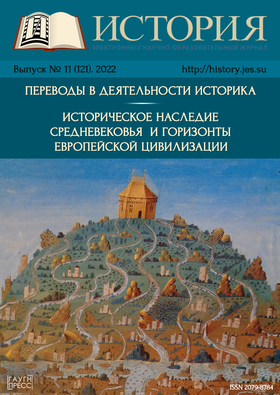
Share
A historian-medievalist and those people he studies, with or without meaning to, found themselves to be wrapped up in the problem of a translation. It is referred to the translation of terminology, concepts, and traditions of one culture into another’s language. During the Middle Ages, this ‘other’ tradition was largely represented by the Antiquity (sacred and secular), as well as the cultures of people living next to or at some distance from the authors. Medievalists translate terms and notions of medieval people into the language of our present-day culture. But by doing this, they inevitably have to sacrifice certain shades of meaning to make it understandable for our contemporaries. This problem is the main focus of the first part of this thematic issue, especially for the articles under the first heading. The others deal with particular aspects of the difficulties with translation in connection with different life spheres.
In Antiquity and the Middle Ages, the most important ideas for modern civilization, mental paradigms and cultural forms were formulated. Scientific, legal and social ideas that arose in the deep and, as it seems to many people, almost forgotten past, created the horizon of European culture, which in some of its parts is only now beginning to take on more or less distinct outlines. The multilingual, colorful environment of the Mediterranean gave birth to a synthetic structure that still determines what is “good” and what is “bad”, what is “possible” and what is “not possible”, how to act, manage and think, what to teach. The studies of leading experts in the field of Ancient history, Medieval, Oriental and Byzantine studies, and Modern history as well as young Medievalists from IWH RAS, Moscow State University, Institute of Asia and Africa of MSU and the University of Albany, forming this part of the issue, provide the reader with the opportunity to observe the above-mentioned phenomena in specific historical forms and often rather unexpected details.
In the works of urban historians, the historical heritage of the Middle Ages appears in different perspectives: from studying ways to recreate the urban environment and non-academic practices of interpreting the medieval past of English cities to identifying ways to form national identity (in Paris in the 14th — 15th centuries), traditions of organizing crafts and managing artisans and merchants in 13th-century Paris. The reconstruction of the historical context based on the study of unique documents allowed the authors to present traditional and new practices of social interaction in the urban environment (development of cooperative trade in England in the 19th century), between cities and their surroundings (in Flanders during the Wars of Religion in the 16th century).
